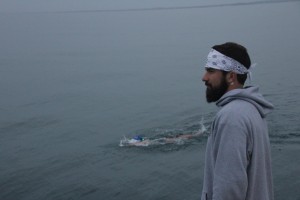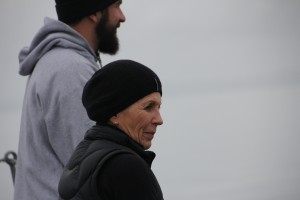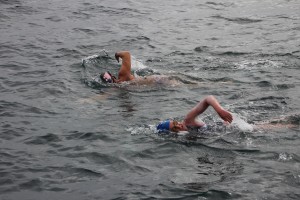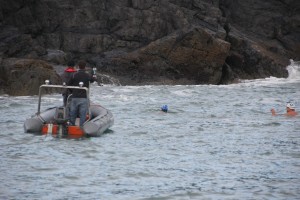GREETINGS FROM NORTHERN IRELAND!
Kim’s 13:06 success in the North Channel yesterday made her the 3rd female and 1st person from the southern hemisphere (New Zealand) to complete the ‘Oceans Seven’ Challenge! Amazing Job Kimberely!! We are (as well as supporters from around the world) SO PROUD!!!
I wanted to write a blog to help give some advice to other observers, or crew members, aboard a cold water ocean endeavor. In the sport, we all have heard horror stories about swims that have gone wrong somehow. The toughest job we have as crew is to monitor and guide our swimmer when they might not be thinking as clearly themselves. I hope you all have the opportunity to continue giving back to the sport we all love, and for those outside the sport, I’d be glad to get you involved with some of the most incredible endurance athletes. Yesterday was one of the most amazing experiences of my life. It was quite an honor to crew for Kim on the final leg of her ‘Oceans Seven’ Challenge. She is one of the toughest competitors I have had the pleasure of knowing, and I could not have been more excited to be here supporting her! Her Mum and friend, Matt, were so instrumental in helping get her feedings right, keeping her spirits high and giving her the courage and motivation  needed to succeed in one of the toughest channels in the world. As many of you know, she was hospitalized after her journey due to the onset of hypothermia, as well as issues breathing due to the enormous amount of jellyfish stings she took during her success.
needed to succeed in one of the toughest channels in the world. As many of you know, she was hospitalized after her journey due to the onset of hypothermia, as well as issues breathing due to the enormous amount of jellyfish stings she took during her success.
A few pieces of advice…
1. With ear plugs, the constant splashing of water and being generally incoherent, we have no idea what you are saying, despite the fact you are yelling it at the top of your lungs. The trouble when you are yelling at your swimmer, especially if they are in a weakened state, it will cause them to continue stopping during crucial times to understand you. Unless it is something truly vital, wait until a feeding, or blow a loud whistle to get their attention and then give your instructions. I will say it again; we cannot hear you so do not bother. 
2. Very hot feeds are essential, and should be practiced with prior to swimming in the cold. The feeds heat up your core, and give you a boost of energy when you need it the most. Bring an electric kettle just in case, or confirm with your pilot that they have a heating apparatus on board. It can help save your swim, but more importantly, your life. When I did the North Channel, my feeds were so hot I could barely swallow them. I know this got me across.
3. Practice with your feeding apparatus prior to going after a swim. Although it may have worked in other channels, make sure your bottle will not open up in the water upon being thrown far off the boat. My advice is to buy the gels you like in the squeeze bottle form, because the little packets are too difficult to tear open, either ahead of time, or by the swimmer. Two things happen: 1. you lose precious nutrients when being thrown out to you because the top is off, or 2. you litter in the ocean by ripping off the top and spitting it out – possibly allowing the whole gel package to float away. If you have any questions on what has worked for me, please send me a contact question or PM me on Facebook.
4. Be in the water with th e swimmer. I don’t care if it is in the low-50s, crew members should have their suit ready and willing to enter the Channel when you FIRST see your swimmer beginning to show signs of irritation, and again throughout the day. Matt and I both supported Kim in the water, and I know it had a huge impact on her. Having a support swimmer gives a mental boost that we are not the only ones out there taking a beating, and having a friend along for the pain is the best!
e swimmer. I don’t care if it is in the low-50s, crew members should have their suit ready and willing to enter the Channel when you FIRST see your swimmer beginning to show signs of irritation, and again throughout the day. Matt and I both supported Kim in the water, and I know it had a huge impact on her. Having a support swimmer gives a mental boost that we are not the only ones out there taking a beating, and having a friend along for the pain is the best!
5. One of the best things as a channel swimmer is when (if your pilot has this) the ‘dingy’ is lowered into the water with a crew member to guide you into the finish. Yesterday, when Kim was very weak and hypothermic, I requested to be in the craft and out on the water with her as close as possible; earlier than I normally would have been out there. I did this because it would psychologically give her a boost knowing that we were getting close, despite being about a mile out. At that point, they aren’t really aware as to how far out they are, and even in a weakened state I believe the mind will be able to process what that means.
6. Stand at the front of the boat as much as possible, and keep an eye out for jellyfish. If your swimmer is about to swim through a massive pod of hazardous jellies, blow the whistle and help guide them through the mess. Sometimes there is nothing they can do and are stung, however it is crucial if you can help limit the amount of stings.
7. Ultimately, look for the warning signs of hypothermia. The swimmer ‘claw’, a rapidly dropping stroke rate and being generally incoherent and unresponsive to simple questions. I have never had to pull a swimmer, and hope I never have to. Consult with the captain and official observer, as they are vital pieces of the equation and have seen swimmers in this state of mind and body. Crew members unfamiliar with the sport should never be in charge of the swimmer being pulled, as emotions run high with close family members and friends. Live to swim another day. Respect your crew and understand you have to trust who you put in charge with your life. 
8. Stay positive and encourage your swimmer by any means necessary. In the days before the swim, write down a few things that gives your swimmer motivation and inspiration. Use these pieces of information during the attempt to fire your swimmer up and get them moving strong! There is nothing better than when a crew member helps motivate me through the dark times.
Kim is smiling, laughing and being positive despite her unfortunate visit to Ulster Hospital. She is overwhelmed with the kindness you all have shown her, and know she has been reading all of your well-wishes. Please give her some time to get back to you as she needs her rest to get back to the normal rock star we all know her to be! Cheers to adventure and live on all cylinders.
Love and respect from Bangor,
Darren
